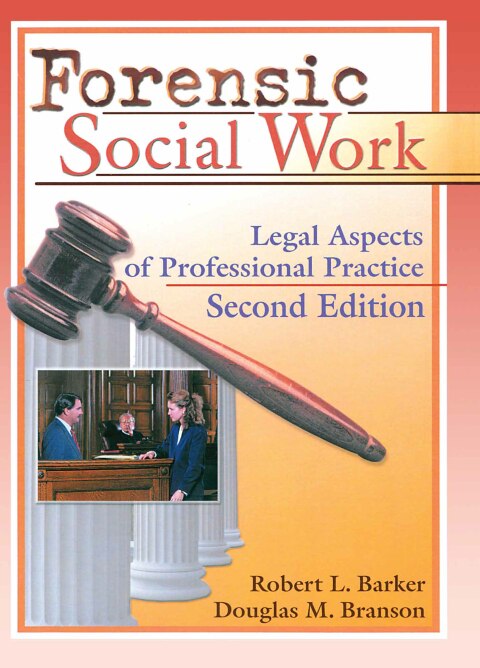Description
Efnisyfirlit
- Cover Page
- Half Title page
- Title Page
- Copyright Page
- Contents
- About the Author
- Preface and Acknowledgments
- Chapter 1 Forensic Social Work in a Litigious Society
- The Purpose of Forensic Social Work
- Law in the Origins of Social Work
- Early Affinity of Social Work and the Law
- Divergence between Social Work and the Law
- Growth of the Litigious Society
- Social Work’s Renewed Interest
- What Social Workers Must Know about the Law
- The Emergence of Forensic Social Work
- Chapter 2 The Practice of Forensic Social Work
- What Do Forensic Social Workers Do?
- Motivations for Forensic Social Workers
- Payment for Forensics Experts
- Positive Incentives
- Forensic Social Work as a Part-Time Occupation
- Steps toward a Forensics Specialty
- How Expert Witnesses Become Established
- Referral-Building Activities
- Forensic Marketing Organizations
- Forensic Professional Groups
- Forensic Experts in Related Fields
- National Organization of Forensic Social Workers
- Conclusion
- Chapter 3 Testifying in Courtrooms
- Types of Courtroom Witnesses
- Roles of the Social Work Fact Witness
- Distinguishing Fact and Expert Witnesses
- The Subpoena
- Presenting Testimony Effectively
- Responding to Direct Examination
- Responding to Cross-Examination
- Hazards in Presenting Testimony
- Testifying against Clients
- The Testimony of Children
- Recovered or Implanted Memory
- Ten Guidelines for the Effective Witness
- Chapter 4 Testifying As an Expert Witness
- Pretrial Negotiations
- Negotiating Payment
- Preparation as an Expert Witness
- Rehearsing Expert Testimony
- Voir Dire: Qualifying as an Expert
- Presenting Expert Testimony
- Direct Examination of the Expert
- Cross-Examination of Expert Witnesses
- Tactics to Impeach Expert Witnesses
- Conclusion
- Chapter 5 Malpractice and How to Avoid It
- Some Malpractice Examples
- Responsibility for Therapy Outcomes
- Alleged Child Abuse: To Report or Not?
- The Ramona Case
- Criteria for Malpractice Liability
- Preventive and Defensive Practices
- Conduct Leading to Malpractice Claims
- Malpractice Suits for Incorrect Treatment
- Malpractice for Sexual Misconduct
- Misuse of Influence
- Breach of Confidentiality and Defamation
- Faulty Diagnosis or Assessment
- Death/Suicide of Client
- Failure to Refer to Other Professionals
- Premature Termination
- Treatment Without Informed Consent
- Failure to Warn
- Chapter 6 When Laws and Ethics Collide
- The Limits of Confidentiality
- Child Abuse and Neglect Laws
- “Duty to Warn” Laws
- The Tarasoff Case
- Implications of the Tarasoff Rulings
- Confusion and Contradictions
- Rationale of Judges and Legal Officials
- Guidelines for Coping
- Implementing the Actual Warning
- Jaffee Vs. Redmond
- Implications of Jaffee vs. Redmond
- Conclusion
- Chapter 7 Preparing for Litigation
- Recognizing a Potential Legal Hazard
- The Emotional Risks of Litigation
- When to Seek Legal Help
- Costs of Litigation
- Goals in Hiring a Lawyer
- Finding the Right Lawyer
- Retaining the Lawyer
- Trial or Settlement?
- On Trial for Malpractice
- Chapter 8 Professional Review: Judgment by Colleagues
- Need for Alternatives to Law Courts
- Philosophies of Reviewing Organizations
- Types of Sanctions
- Disciplinary Action Reporting System (DARS)
- Third-Party Review Procedures
- NASW Peer Review Procedure
- Outcomes of NASW Reviews
- Critique of NASW Adjudication Procedures
- Other Professional Review Procedures
- Inevitability of Peer Review
- How to Avoid or Minimize Sanctions
- When Misconduct Is Acknowledged
- Chapter 9 Case Recording and Written Contracts
- Report Writing for the Litigious Society
- Record Keeping for Couples and Families
- The Problem-Oriented (SOAP) Record
- Accessibility of Case Records
- Forensics Reports Versus Case Records
- The Written Contract
- Objectives of the Written Contract
- Appearance of Contracts
- A Prototype Contract
- Presenting the Contract to the Client
- Enforceability of the Contract
- Why Written Contracts Are Rare
- Is Contracting Antipsychosocial?
- Influences Toward Contracting
- Written Versus Verbal Contracts
- The Preservation of Contracts and Records
- Conclusion
- Chapter 10 Legal and Professional Credentials
- Practicing without Credentials
- Consequences of Misrepresentation
- What Are Credentials?
- Credentials by Professional Associations
- Credentials by Public Statute
- Origins of Social Work Credentials
- Requirements for Professional Credentials
- The ACSW
- The QCSW
- The SSWS
- The DCSW
- ABE’s BCD
- The FTPA
- The NMCOP
- NAP
- Other Credentialing Organizations
- Social Work Licensure
- Functions of the Licensing Board
- Licensing Examinations
- Comparing Credentials with Other Professions
- Unresolved Credentialing Problems
- The Grandparent Rule
- Continuing Education Requirements
- The AASSWB Model Social Work Practice Act
- Conclusion
- Appendix: State Boards of Social Work Licensure
- Alabama
- Alaska
- Arizona
- Arkansas
- California
- Connecticut
- Delaware
- District of Columbia
- Florida
- Georgia
- Hawaii
- Idaho
- Illinois
- Indiana
- Iowa
- Kansas
- Kentucky
- Louisiana
- Maine
- Maryland
- Massachusetts
- Michigan
- Minnesota
- Mississippi
- Missouri
- Montana
- Nebraska
- Nevada
- New Hampshire
- New Jersey
- New Mexico
- New York
- North Carolina
- North Dakota
- Ohio
- Oklahoma
- Oregon
- Pennsylvania
- Puerto Rico
- Rhode Island
- South Carolina
- South Dakota
- Tennessee
- Texas
- Utah
- Vermont
- Virgin Islands
- Virginia
- Washington
- West Virginia
- Wisconsin
- Wyoming
- Glossary
- Bibliography
- Index






Reviews
There are no reviews yet.